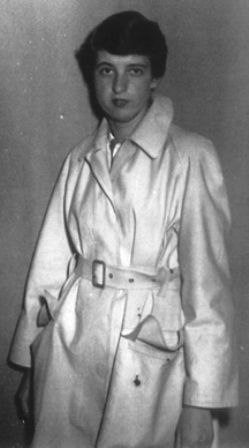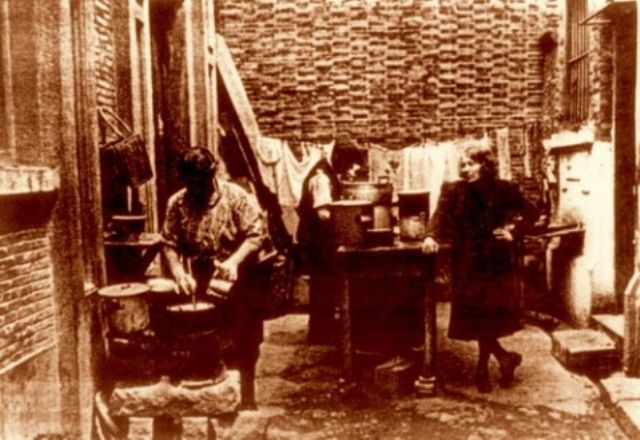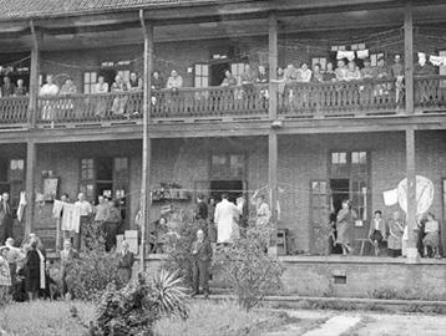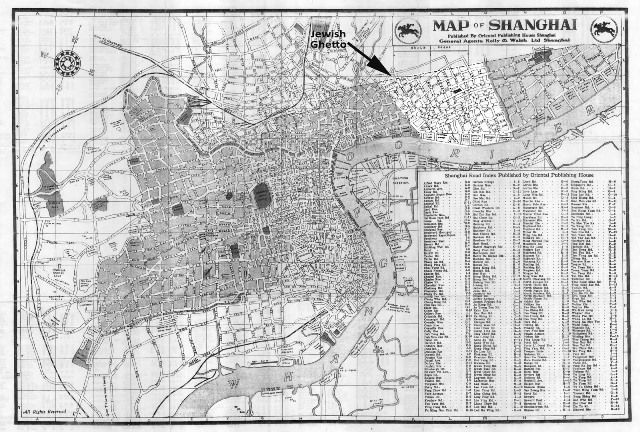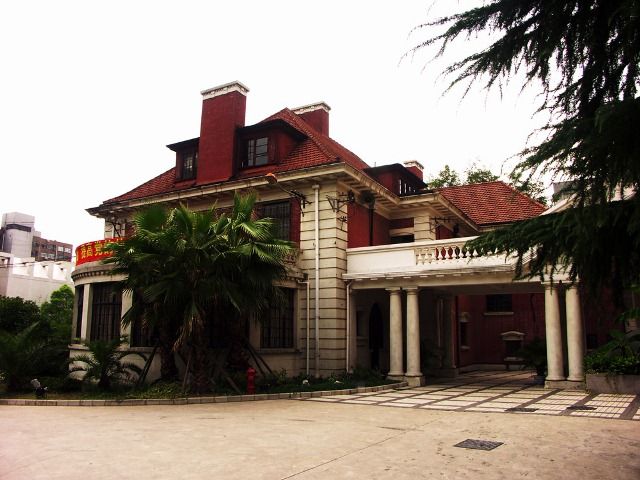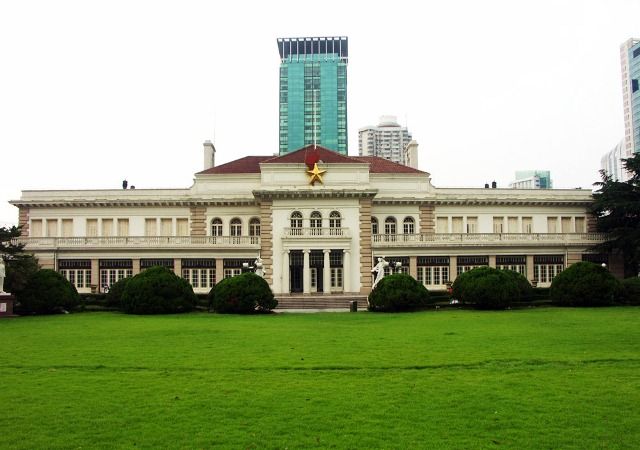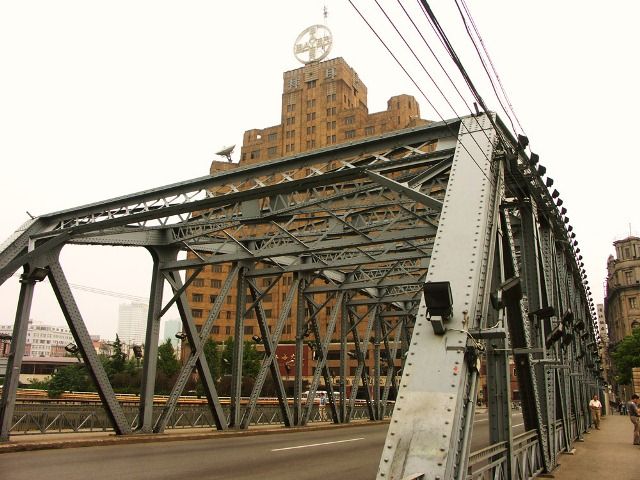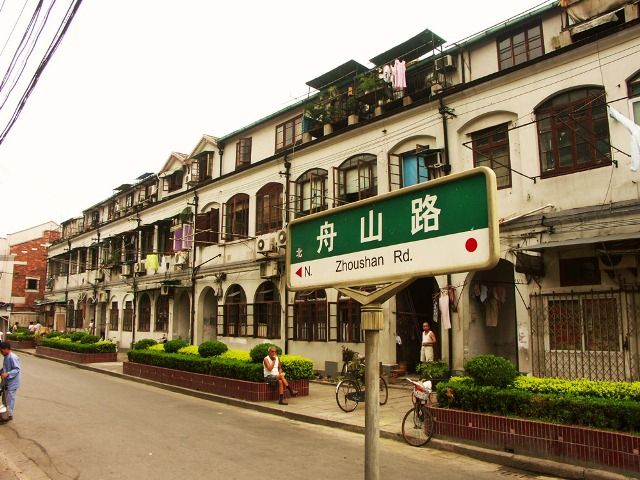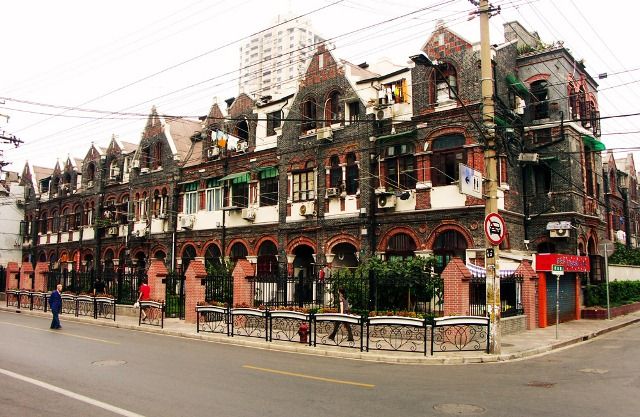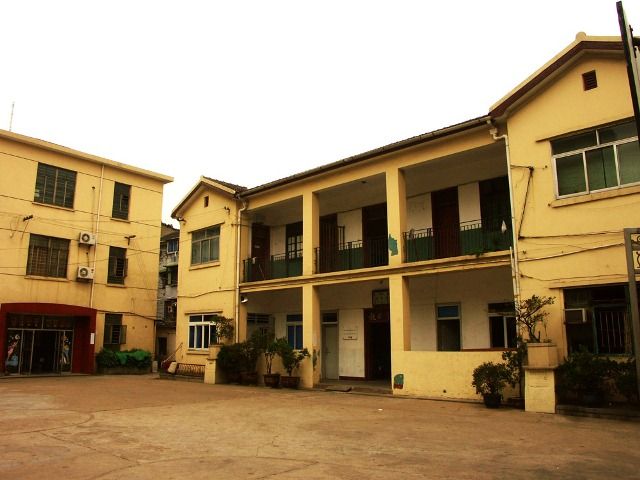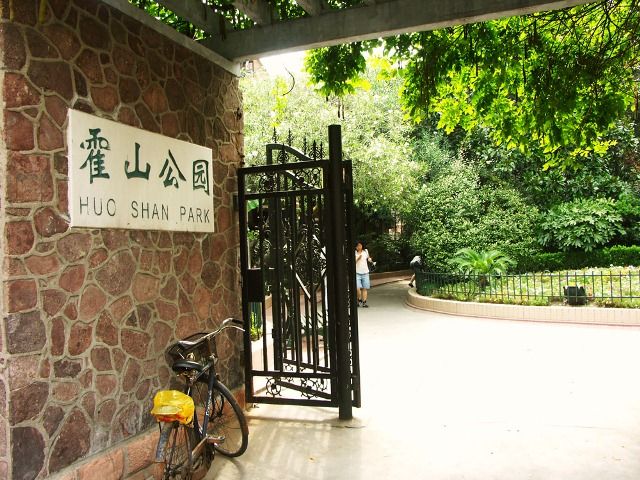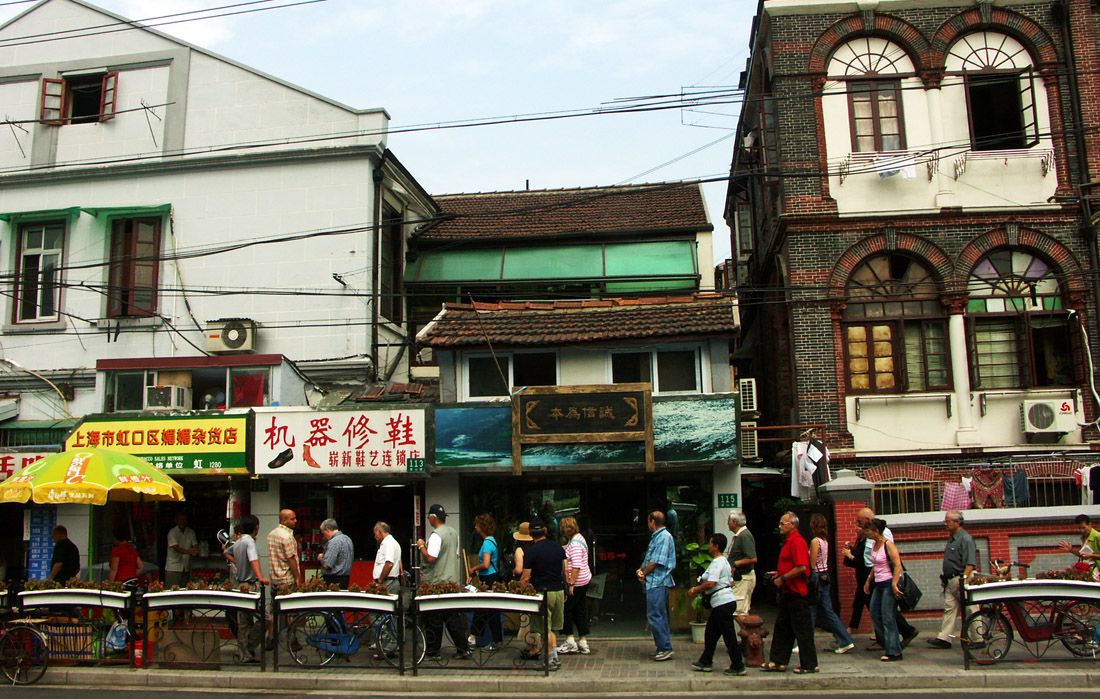- 哈佛的故事:真假習明澤 [2015/04]
- 在美國如何免費看電視:ROKU好用嗎? [2013/10]
- 有史以來最蠢的哈佛學生? [2013/12]
- 華為思科的血海深仇是怎樣結下的? [2018/12]
- 付不起學費?美國上大學的省錢之道 [2013/09]
- 卡梅爾:尋找張大千在加州的足跡 [2019/01]
- 紐約哈萊姆區探秘 [2015/05]
- 在美國養個娃有多貴? [2015/01]
- 學鋼琴有用嗎? [2011/09]
- 斯坦福直線加速器SLAC探秘 [2015/09]
- 我們應該為孩子買房嗎? [2015/03]
- 選擇的負擔:我們為什麼要移民? [2014/10]
- 數學「諾貝爾獎」揭曉:又沒中國人啥事 [2014/09]
- 中國教育是世界第一嗎?從PISA考試談起 [2013/12]
- 好男人都死哪兒去啦? [2016/09]
- 家有才女 大事不好 [2011/12]
- 美國大選:投了也白投,白投也要投 [2012/10]
- 進村一周年感言:桃源夜話 [2012/06]
白露為霜註:大女兒大寶自小熱愛歷史,高中有段時間對二戰史,特別是大屠殺(Holocaust)的歷史很有興趣,做了很多研究。上海猶太人是其中短暫但令人印象深刻的事件,她花了很多時間找到了一位倖存者,並進行了採訪。本文後來在一家英文報紙上發表。隨著時間推移和親歷這段歷史的人的漸漸凋零,文章的文獻價值慢慢顯露出來。白露特意把它翻譯成中文,希望有更多的人了解這一段既是猶太人的也是中國人的歷史。博文中使用的部分照片來自於中國攝影家協會會員郭大公先生(網名:gdecn),特此鳴謝。
海上方舟:一個猶太女孩在上海的故事
(Eva Hirschel』s Shanghai Story)
我輕敲房門,隨後聽見了她的聲音,「門是開的。」
這是一間位於美國北加州的兩居室公寓,伊娃·赫歇爾 (Eva Hirschel) 是一個小個的老太太,坐在牆角的窗邊,看著孩子們在院子里嬉鬧。
我稱她為伊娃,雖然她可以做我的外婆了。我放置停當錄音機,不需要做任何提示,她侃侃而談,伊娃已經準備好講她的故事。
1933年希特勒成為德國總理(Chancellor)。在此前5年,伊娃出生於德國布雷斯勞 (Breslau)的一個猶太家庭。他們是普通人,帶著恐懼,敬畏和難以置信的混合心情看著一個瘋子爬上權利之顛。作為一個孩子,她見證了「水晶之夜」(Kristallnacht) [注1] 的瘋狂的仇恨和令人心碎的殘酷。弟弟在學校被打,她被希特勒青年團(Hitler Youth)羞辱和吐唾沫。
1940年她11歲時,父親被關在布痕瓦爾德集中營(Buchenwald )六個星期。當他被放出來后一家人感覺到德國是不能待了,伊娃和父母,還有弟弟在義大利熱那亞(Genoa)搭上了去上海的輪船。
中國上海,一個由中國和國際兩個市政局共同管理的開放港口城市,不需要入境簽證,是世界上唯一願意接受他們的地方。伊娃後來發現,她們乘坐的義大利客輪,Conte Verde,是最後一班離開歐洲的客輪。在半途中義大利加入第二次世界大戰,她家族其餘的人都被困歐洲了。
在30年代末和40年代初,對於超過兩萬歐洲猶太人來說上海曾經是家。這意味著絕望的生活條件,無時不在的飢餓,奇怪的語言;這意味著穿越數千公里的不確定海洋,到達罪犯黑幫出沒,混亂習以為常的城市。但最重要的是,當納粹黨旗飄揚在從巴黎到波羅的海的歐洲大地時,上海意味著一個躲避希特勒和大屠殺的避風港。
在局促困頓和疾病纏身之中,伊娃在上海度過了她的少年時期。當時上海被日軍佔領,日本佔領者會因為最輕微的事情就拿刺刀亂刺中國人。到了1943年[注2],猶太人被趕進貧困的「虹口隔離區」( Hongkew Ghetto)。早上,死於飢餓或疾病,被報紙包裹的屍體就會出現在街道上。
伊娃15歲時退學來支持她的家庭,母親體弱多病,父親是個酒鬼,弟弟還只是個孩子,她便成了家庭的主心骨。她回憶說,「家人同另外24人住在一所房子,共用一個只有冷水的浴缸和兩個小廁所。他們住在一個房間里中間隔一個夾板牆,另外半間住另一對夫婦。」
然而並非所有上海的回憶都是暗淡的。伊娃,如同30年代世界各地數百萬記的兒童,崇拜偶像秀蘭·鄧波兒(Shirley Temple)。她一直以為美國童星也跟自己一樣 – 是一個德國猶太裔女孩。
伊娃回憶到: 「我剛到上海只有幾個星期,有一天走在一條岔路上,我正巧路過一家電影院,在那裡有一張大型的海報,讓我驚喜萬分的是秀蘭·鄧波兒正對著我微笑。我幾乎要擁抱了她,我真的很高興而且鬆了口氣。「
伊娃跑回家,告訴母親這個好消息。
「秀蘭,秀蘭·鄧波兒。是不是很美妙?她離開了德國。她安全了,而且生活在上海。我知道。我看到了她的照片了。「
數以千記的猶太人也像伊娃那樣在上海活了下來 – 靠著決心,智謀,和百折不撓的精神,使他們能夠戰勝來到新城市的諸多挑戰。很短時間內,一個繁榮,熱鬧非凡的猶太文化便在上海出現 。一流的劇院,芭蕾,音樂會,報紙被印成十幾種語言,還組成了校際運動隊。上海的猶太區被稱為「小維也納」。
由於日本人的新聞審查,上海的猶太人完全不知道他們在歐洲的家人怎麼樣了。直到戰爭結束后,艾森豪威爾視察解放了的納粹集中營的圖像傳來,他們才知道這一恐怖的消息。
「誰能想象得到嗎?我們的隔離區里一片死寂,你可以聽到針掉在地上。沒有一個人沒有失去親友的。 發生在1940年呢?發生在德國?發生在歌德,尼采,勃拉姆斯和貝多芬的國家?我永遠無法理解這一切。」
伊娃留在歐洲的家族成員都死於大屠殺,如果不是在身體上,便是在心靈上。在20世紀70年代,她遠赴柏林看望家族唯一的倖存者,曾在集中營中待過的小姨。「我的阿姨,我還是一個小女孩的時候就知道她,我總是到他們家度過假期。她不知道我是誰,我來做什麼呢?「
心碎不已,她再也沒有回到歐洲去。
大多數上海猶太人在二戰結束后便去了美國,加拿大,澳大利亞,以色列等地開始了新的生活。少數留下來的經歷三年的中國內戰(解放戰爭),和毛時代的早期,但到了50年代末,上海繁榮一時的猶太區已經全部消失了。
儘管困難和飢餓,伊娃認為她在上海的經歷是非常積極的:「我們很快長大 - 我們學會了責任,我們學會了互相幫助。我不羨慕這裡(美國)的孩子的一切。我不會拿它換世上任何的東西。「
伊娃的一生既是平常的,也是不同尋常的。她拿出蓋有塵土的相冊,從泛黃的頁面里走出一個鮮活的年輕女子,在酒吧與朋友喝酒, 坐在B-29轟炸機翼尖上,挎著身穿美軍制服的新墨西哥州「甜心」的手臂咯咯地笑。她的笑容,她的舉止,她的活力掩飾了內心的痛苦。
50年代的伊娃·赫歇爾
我第一次見到伊娃是在北加州Cotati的尼珥沙洛姆(Ner Shalom)猶太教堂在的一次會議上。我讀過不少書,聽了看了許多關於大屠殺的錄音和錄相。不過伊娃是我採訪的第一個倖存者,儘管她拒絕承認她是一個「倖存者」。採訪給我留下了一個堅定的信念,個人的溝通比任何媒體能產生的力量強大得多。作為學生,我們可以為這種溝通做出自己的貢獻,這樣才能確保大屠殺的確「永遠不再發生」 (Never Again)。
我的心裡會永遠帶著一個影像:一個小女孩在寒冷的,裸露的義大利火車站上,不知道她是否會被允許離開和活下去。這時時提醒自己,我們生活在一個充滿偏見,仇恨和暴力的世界。因此,我們的責任不僅僅是口頭上說,「我們記住了」,而是每天都把這句話行出來。在緬懷那些偏見和歧視受害者的同時,我們必須學會放棄自己的偏見和仇恨的武器。
這有時看起來幾乎是不可能。
然而,我問過伊娃或者其他上海猶太人有沒有想過復仇。她激烈地搖頭:「有憂傷,有悲痛,憂傷總是在的。但是,報復 - 沒有,沒有,從來沒有」。
這句話永遠不會停止激勵我。
[注1] 「水晶之夜」(也翻譯成「碎玻璃之夜」)是指1938年11月9日至10日凌晨,納粹黨員與黨衛隊襲擊德國全境的猶太人的事件。這被認為是對猶太人有組織的屠殺的開始。
[注2] 日軍在八一三后佔據了上海,但早期並沒有進入租界,猶太人日子相對好過。太平洋戰爭爆發后,日本人完全佔領租界並把在上海的交戰國的僑民(包括很多猶太人)關了起來。從歐洲來的猶太人被當作無國籍僑民趕進虹口隔離區。
住在隔離區的猶太人
上海老地圖標註猶太人隔離區
位於上海汾陽路的原猶太人俱樂部 (郭大公)
中國福利會上海少年宮原是猶太富商迦道理的宅第 (郭大公)
位於上海陝西路的原猶太會堂 (郭大公)
上海蘇州河口原外白渡橋.由此通往昔日猶太人隔離區 (郭大公)
位於上海虹口區的舟山路是原猶太人隔離區的市場 (郭大公)
位於上海虹口區舟山路的原猶太人隔離區住宅 (郭大公)
提籃橋監獄周邊地區是當年猶太人隔離區 (郭大公)
霍山路小學當年曾接待猶太兒童入學 (郭大公)
霍山公園曾是猶太人墓地之一 (郭大公)
2005年8月猶太人訪問團在虹口霍山路尋訪 (郭大公)
Eva Hirschel』s Shanghai Story
I knock, and I hear her voice: 「the door』s open,」
It』s a two-bedroom apartment in Rohnert Park, California and she』s a little lady, sitting in the corner by the window, watching kids scream outside.
I call her Eva, though she could be my grandmother. I set the tape recorder down, and without prompting, she speaks. She is ready to tell her story.
Eva was born in Breslau, Germany to Jewish parents less than five years before Hitler became chancellor in 1933. They were ordinary people, who watched with a mixture of fear, disbelief, and awe as a madman came to power. As a child, she stood witness to the blind hatred and shattering cruelty of Kristallnacht or 「the night of broken class」. Her brother was beaten up in school and she was humiliated and spit upon by the Hitler Youth.
She was eleven years old in 1940, when after her father spent six weeks in Buchenwald concentration camp, she and her parents, along with younger brother set sail for Shanghai by way of Genoa, Italy.
Shanghai, China was the only place that would take them, an open port city ruled jointly by the Chinese and an international municipal council which required no visa for entry. Eva would later discover that their Italian liner, the Conte Verde, was the last one out of Europe. Italy joined Germany in WWII midway through the voyage, and the rest of her family was trapped.
For over 20,000 European Jews in the late 1930』s and early 1940』s, Shanghai was once home. It meant desperate conditions, constant hunger, and strange languages. It meant traversing thousands of miles of uncertain ocean to reach a crime-infested, chaos-accustomed city. But most importantly, Shanghai meant a safe haven from Hitler and the Holocaust at a time when the Nazi flag flew from Paris to the Baltic.
Eva spent her teenage years in Shanghai, living in conditions that were impossibly cramped and disease-ridden. The Japanese occupiers bayoneted Chinese for the slightest infractions, and in 1943, Jews were herded into the poverty-stricken Hongkew 「ghetto」, where corpses wrapped in newspapers appeared on the streets every morning, dead from starvation or diseases.
Eva quit school at fifteen to support her family: her mother was an invalid, her father a drunkard, and her brother a mere boy. She recalled that 「[her] family lived in a house shared by 24 other people with one bathtub, cold water and two small toilets. [They] lived in one room, which was separated in half by a tiny plywood wall in order to accommodate another couple.」
Yet not all the memories of Shanghai were bleak. Eva, like millions of pre-teens around the world in 1930s, idolized Shirley Temple, and saw the American child star as a reflection of herself – a German Jewish girl.
「I had been in Shanghai only a few weeks when one day, walking down Wayside Road, I happened to pass a cinema and there to my utter joy and delight was a large poster from which Shirley』s eyes smiled at me. I could have hugged her. I was so happy and relieved.」
Eva ran home and told her mother about the news.
「Shirley. Shirley Temple. Isn』t that wonderful? She got out of Germany. She is safe and living right here in Shanghai. I know. I saw her picture.」
Thousands of other Jews survived much as Eva did -- with determination, resourcefulness, and a sort of relentless spirit that allowed them to prevail over the many challenges presented by the city. A thriving, boisterous Jewish culture developed with first-rate theatre, ballet and concerts. Newspapers were printed in half-a-dozen languages, and intramural sports teams were organized.
The Jewish quarter of Shanghai became known as 「Little Vienna.」
The Jews of Shanghai knew nothing of what happened to their families in Europe, as all information was censored by the Japanese. It was not until after the war that images of Eisenhower inspecting the death camps came through, and they were given knowledge of the horrors that had come to pass.
「Who could have imagined? It was so quiet in our ghetto that you could have heard a pin drop. There wasn』t a single person who hadn』t lost somebody. In 1940? In Germany, the country of Goethe and Nietzsche and Brahms and Beethoven? I can never understand it.」
Every member of Eva』s extended clan left in Europe was lost to the Holocaust, if not in body, then in mind. In the 1970』s, she traveled to Berlin to see the lone survivor, her mother』s sister, who had been in concentration camp. 「My aunt, who I knew since I was a little girl; I always spent my vacations with them, she didn』t know who I was. What was I doing there?」
She has never since gone back to Europe.
After the end of the WWII, most Jews looked towards new lives in the United States, Canada, Australia, and Israel. A few stayed behind to weather three more years of Chinese civil war, and the early days of Mao. But by the late 1950s, the once thriving Jewish ghetto in Shanghai had all but vanished.
Despite the hardship and the starvation, Eva thinks of her experiences in Shanghai as overwhelmingly positive: 「We grew up so fast -- we learned responsibility; we learned to help each other. I don』t envy the kids here [in US] at all. I wouldn』t have traded it for the world.」
Eva』s life is as ordinary as it is extraordinary. She pulls out her dusty photo albums, and from the yellowed pages peers out a vivacious young woman, drinking at a bar with friends, perched on the wing-tip of a B-29 bomber, giggling on the arm of a New Mexico sweetheart in an American army uniform. Her smile, her demeanor, her utter vibrancy belied what she was suffering.
When I first met her at a conference at the Ner Shalom synagogue in Cotati, California, these were the things that defined Eva the most. I have read many books on the Holocaust, heard many speakers, and watched many videos. But Eva was the first survivor I interviewed. And despite her denial, she is a survivor. I left with a strong conviction that personal communication is far more powerful than anything that the media can produce. Communication is what we, as students, can instigate to ensure that the Holocaust is indeed, 「never again」.
I will forever carry in my heart the image of a little girl in a cold, bare Italian train station, not knowing whether she would be allowed to leave and live. These are the images that remind us that we live in a world ridden with prejudice, hatred, and violence. Thus it is our responsibility, that we not only say, 「we remember」 but live by that phrase every day. In remembering those who were victims of prejudice and discrimination, we must learn to relinquish the weapons of prejudice and hatred ourselves.
Sometimes it seems near impossible.
Then I asked Eva whether she or Jews of Shanghai ever thought of vengeance. She shook her head furiously: 「There was sadness. There was sorrow. There always will be sorrow. But revenge - no, no, never.」
This statement will never cease to inspire me.
- [11/30]美國大學升學作文趣談
- [12/12]昔日一夜爆紅 最美的「愛瘋」女孩今何在?
- [12/28]哈佛故事:此花非花
- [01/09]怪圈:讀《百年孤獨》和《生死疲勞》有感
- [01/21] 海上方舟:一個猶太女孩在上海的故事
- [01/31]酒鄉記事:科貝爾(Korbel)香檳的故事
- [02/10]浪漫溫馨的聖地亞哥老城
- [02/18]加州理工是你的「菜」嗎?
- [02/28]「戴珍珠耳環的少女」驚艷舊金山
- [03/11]又見瘋狂:看華裔擇校的誤區
- [03/24]耶穌會士在中國的傳奇故事
- [04/03]普林斯頓媽寫給女兒的信
- 查看:[白露為霜的.最新博文]
- 查看:[大家的.最新博文]
- 查看:[大家的.留學生活]
發表評論 評論 (63 個評論)

- 回復 fanlaifuqu
- 以前在上海見過許多猶他人。還有來自俄國的白俄。
照片上那些地方都熟悉!

- 回復 總裁判
- 蘇聯包括當時幾個加盟所謂共和國,也歧視猶太人,被驅趕的和自己逃離原蘇聯的白俄中,有不少是猶太人。
fanlaifuqu: 以前在上海見過許多猶他人。還有來自俄國的白俄。
照片上那些地方都熟悉!
白俄到上海來開店做麵包,做帽子。

- 回復 fanlaifuqu
- 還有磨刀的,技術與國人不一樣。
總裁判: 蘇聯包括當時幾個加盟所謂共和國,也歧視猶太人,被驅趕的和自己逃離原蘇聯的白俄中,有不少是猶太人。
白俄到上海來開店做麵包,做帽子。 ...

- 回復 小皮狗
- 讀了您的這篇博文,我不知不覺產生一個衝動:如果你的女兒大寶就在我的面前,我會擁抱她,好好親她的額頭,對她說:「我是多麼地為你驕傲,從心底里發出歡呼,為你的認知,為你的成熟,為你的善良,為你的正義,為你的一切的一切。。。你是我們心目中的好寶寶。」

去年,就猶太人成功進入上海而得以倖存的簽證問題,我也有一篇小文:想說"大愛無疆"http://my.backchina.com/home.php?mod=space&uid=329593&do=blog&id=158767

- 回復 白露為霜
- 俄國來得人很多也是猶太人,他們來的更早,有些逃避蘇聯革命的。但最有錢的還是從中東來的猶太人,像沙遜家族,在上海發的財。
fanlaifuqu: 以前在上海見過許多猶他人。還有來自俄國的白俄。
照片上那些地方都熟悉!
謝謝留言。

- 回復 fanlaifuqu
- 姑媽家就在離舟山路很近的惠民路。
白露為霜: 俄國來得人很多也是猶太人,他們來的更早,有些逃避蘇聯革命的。但最有錢的還是從中東來的猶太人,像沙遜家族,在上海發的財。
謝謝留言。 ...

- 回復 白露為霜
- 20世紀初期俄國版圖上的一些地區也發生排猶事件(Pogroms),不少在俄國的猶太人逃到哈爾濱和上海。十月革命后,一些白俄保皇黨也逃來了。一直到待到解放戰爭。這些人對共產主義和法西斯一樣反感,一看形勢不對,趕緊逃走。
總裁判: 蘇聯包括當時幾個加盟所謂共和國,也歧視猶太人,被驅趕的和自己逃離原蘇聯的白俄中,有不少是猶太人。
白俄到上海來開店做麵包,做帽子。 ...

- 回復 白露為霜
- 50年代后那些同中國人通婚的也逃走,多數去了香港。上海還是有些猶太人剩下的。但多半是風燭殘年,無處可去。
總裁判: 樓主是有學術眼光的。
九十年代上海電視台在製作有關猶太人在上海的紀錄片時,找到最後一位單身猶太後裔,父親是猶太人,母親是上海人。
1949年之前,猶太人都逃 ...

- 回復 白露為霜
- 猶太人對自己的歷史非常在意。光上海猶太人的回憶錄就有幾十本,每年都有有關大屠殺的徵文比賽,鼓勵孩子採訪老一代把歷史寫下來。這方面中國人做的差太遠了。
病枕軛: 感謝大寶~感謝伊娃~感謝大公先生和白露!
歷史也需要覺醒!歷史也需要洗刷自身的泥垢!

- 回復 meistersinger
- 對外國人在中國的經歷很感興趣。幾年前到上海出差,讓計程車司機帶我去以前的猶太區。找了半天最後在一個門臉上找到一個大衛之星。(Star of David)

- 回復 白露為霜
- 謝謝留言。你們家的經歷很特別,希望你能寫下來。也是歷史的原始資料。
meistersinger: 對外國人在中國的經歷很感興趣。幾年前到上海出差,讓計程車司機帶我去以前的猶太區。找了半天最後在一個門臉上找到一個大衛之星。(Star of David) ...
- 白露為霜:怪圈:讀《百年孤獨》和《生死疲勞》有感
- ofox:給戴緑帽子的瓜瓜同學的回信
- 白露為霜:哈佛故事:此花非花
- 白露為霜:昔日一夜爆紅 最美的「愛瘋」女孩今何在?
- 雲間鶴:一個人做弊,所有中國人背黑鍋
- 燕山紅場:莫斯科國立羅蒙諾索夫大學(莫大)
- 穿鞋的蜻蜓:吳新東獲IEEE 計算機學會 2012年度技術成就獎
- 白露為霜:美國大學升學作文趣談
- 卿心依舊溫柔:【東京都八王子市高尾山 Takaoto Zan】
- 白露為霜:愛她恨她,誘惑難擋是宜家
- qwxqwsean:中國留學生比白人乾淨多了
- 麥燕萍:好友黃姐
- 白露為霜:「鳥叔」,「宏哥」和伯克利的啟示
- 白露為霜:古玩客的青秋大夢:在地攤上買到官窯貢品
- mayo:被辣妹涮了
- 白露為霜:美國總統大選的數學問題
- 白露為霜:美國大選:投了也白投,白投也要投
- 白露為霜:綺麗湖的今生與前世
- 穿鞋的蜻蜓:中國人不大知道的美國大學 之 科羅拉多學院

